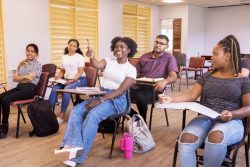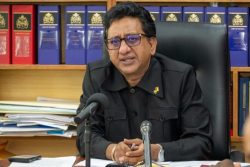In democracies subject to less drama than this one, elections might be occasions for a rise in the level of popular excitement, but generally speaking they are not a source of stress for the average voter. There are speeches and press articles, social media forays, TV and radio interviews, debates between leaders of contending parties, opinion polls and a whole lot of handshaking, hugging and baby-kissing, but while tempers might get frayed every now and then, this does not extend to causing fear or apprehension in the electorate.
In more conventional democratic arenas, however, it is taken for granted that any incumbent government will be dislodged periodically by the voters, and furthermore that when it is, it will automatically accept the result and hand over without demur to whomever the voters have chosen in its place. But then Guyana is not a conventional democratic arena. The problem is that governments traditionally have not been changed every other election or so, and some segments of the population lost hope in the past that this could ever be achieved. In addition, election results which as it is can take an unconscionably long time to be announced are often not accepted by the losing party. This was the case even following the 2015 election, despite the fact that generally speaking it was a relatively quiet poll by our standards.
This current election has generated a great deal of tension, probably mostly because the government did not recognise the result of the no-confidence vote in December 2018, and tried to avoid the inevitable by recourse to the courts. The lengths to which they went to stay in power raised the spectre of earlier days, and aroused unease that once again results might not receive general acceptance, potentially with the kind of consequences which ordinary citizens would rather avoid.
It may be too that uncertainty about the outcome of the election this time around might be adding to the general feeling of nervousness. Perhaps this uncertainty is what caused Minister Volda Lawrence to display such unacceptable irresponsibility by telling APNU supporters to work the “night shift” and watch the ballot boxes after polls had closed. It was definitely not a formula for a peaceful election which all sides claim they are committed to. While there is no doubt about who the president will be – he will come from one of the two major parties – the composition of Parliament may not be so obvious.
The issue is whether either of the two heavyweights can achieve an overall majority in the National Assembly. The presence of third parties who could deny a ‘winner’ such a majority is a relative novelty on Guyana’s political scene. It is a consequence partly of changing demographics, and partly, possibly, of the appearance of an urbanised younger generation less wedded to the shibboleths of the past. The new landscape was at its most noticeable in the 2011 election with the AFC’s debut in the House, although there was a diminution in the number of its supporters in 2015, most likely because former PPP voters who had backed it the first time, refrained from doing so again because of its coalition with APNU.
No one is sure whether the fact that the AFC did not distinguish itself in office from APNU and has now effectively been absorbed by the latter party, has disillusioned potential third- party voters, and whether these will now either abstain from voting or cast their ballots for one of the large political entities. If that happens, the two old warhorses will be in familiar terrain, viewing each other as the only true opponent. In those circumstances the political conversation would have a familiar ring to it, and so potentially (although not necessarily) could the traditional accusations about results.
If the new parties do manage to obtain seats in Parliament, and no one has an overall majority, it would on the face of it be harder for the post electoral exchanges to follow the customary trajectory, although not impossible. There will for instance be the matter of who gets a plurality of the votes, thereby securing the presidency, and that in itself hypothetically speaking could be a factor causing them to pursue a well-trodden path.
Most of the citizens of this country want not just a peaceful election, but a peaceful aftermath to that election. However, they are not necessarily feeling reassured by the challenges in relation to Gecom, or by the statements of some of the politicians. Leaving aside Ms Lawrence’s enjoinders to her constituents which could be interpreted as bordering on the inciteful, there is too at an altogether different level President David Granger’s approach, and his refusal to have his government act in a caretaker capacity. Following the rules is critical in elections, and the leader of a party should be seen to want to follow the rules.
While all contenders seek to convey a confidence that they will win, given the sensitivity of Guyana’s political environment, there may be a fine line between conveying confidence and transmitting the notion to one’s followers that the question of losing doesn’t arise. The danger is that if they do lose, it then theoretically could become a perception that they had been ‘cheated’.
The presence of overseas observers is absolutely essential for the validation of election processes and results, although as the electorate knows from experience it is not always a guarantee that one of the large losing parties will accept their verdict without reservation. At the bottom of the problem is more than six decades of suspicion and mistrust between the PNC and PPP; neither trusts the other’s motives, particularly where issues of power are involved. Among other things, that accounts for most of the problems at Gecom.
Elections are a normal democratic expression in any open society and are not associated with undue tensions. Politicians should remember that voters want them to be the same here too.









